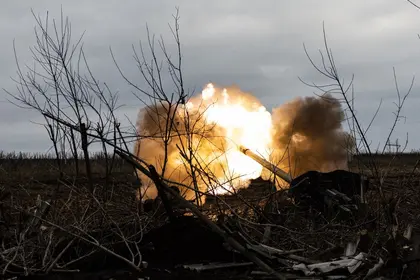The de-occupation of the Kherson region on the ‘left bank’ of the Dnipro River is a critical step for Ukraine’s pending offensive, a leading Ukrainian parliamentarian and decorated war hero said today, and then quickly found himself in hot water.
In an interview with Radio Liberty, lawmaker Roman Kostenko, who is Secretary of Ukraine’s Parliamentary Committee for National Security, Defence and Intelligence and a former military commander, said that taking back the part of the currently occupied on the ‘left’ or western side of the Dnipro River is “possible but very difficult”.
- Obtain the most recent updates on the Ukraine situation today.
- Find the newest Ukraine news pieces that came out today.
JOIN US ON TELEGRAM
Follow our coverage of the war on the @Kyivpost_official.
Within hours of the elected official’s public speculation about the offensive, and the emphasis on Kherson’s 'left bank', the Deputy Minister for Defense, Hanna Malyar, issued a stern statement.
“To speak narrowly about the counteroffensive is incorrect. It is a massive complex of action and efforts which the Armed Forces of Ukraine are readying… These efforts involve preparation of equipment, people, reserves, and the formation of tactics – plans A, B, and C,” Malyar said in a Facebook post.
“The Armed Forces of Ukraine are not preparing some single plan for a specific time or a specific direction. Rather, every day, they prepare a vast array of defensive and counteroffensive strategies,” she said.
Malyar also indicated that current miltary operations in Bakhmut and elsewhere in eastern Ukraine are already part of a broader counteroffensive.

China, EU, Ukraine Leaders Take Davos Stage Under Trump Shadow
A Kyiv Post source appraised of strategic miltary thinking said that “Kostenko is just hyping. He doesn’t actually have access to any real information.”
In his interview, Kostenko, who has a distinguished military record including as a ‘Cyborg’ defender of Donetsk Airport, said that taking the 'left bank' of Kherson “creates the conditions for making Crimea an ‘island’ if we also destroy the Kerch bridge. Then, we can talk about our further advances.”
“We understand that this is difficult. For it to occur, we also need to move in the direction of Berdyansk and Melitopol,” Kostenko said. “That’s a corridor of 80 kilometres. At a minimum, it needs to be 30 to 40 kilometres across not to get closed off, and then there’s another 160 kilometres of open front that also needs to be secured by reserve forces,” he further speculated.
On April 6, Oleksi Danilov, Secretary of Ukraine’s National Security and Defense Council (which is an executive body appointed by President Zelensky rather than a parliamentary one), said that knowledge of the timing and type of pending military operations is limited to a “very restricted group of people”.
“When [the offensive] starts, you will all see everything… Where, when, at what time – these are questions that are now absolutely secret,” Danilov said at the time.
You can also highlight the text and press Ctrl + Enter










